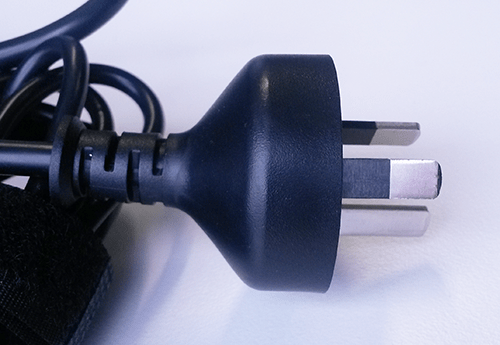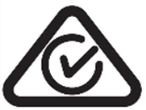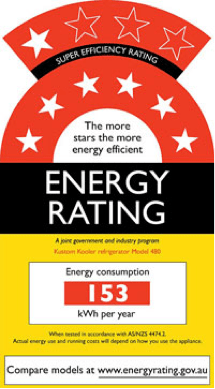Overview
The safe and efficient use of electricity in the home is important for your family’s welfare and may assist you to reduce electricity usage and your costs. Keep your family safe by ensuring all electrical appliances and equipment in and around your home are safe to use and in good working order.
Safe use of electrical appliances and equipment
Follow these simple tips for keeping electrical appliances and equipment in good working order and making your home safe.
- Never use an ageing or faulty electrical appliance including an appliance with a frayed cord, cracked or broken plug, or any appliance that has given someone any kind of shock. Frayed or damaged cords should be replaced immediately or the appliance disposed of. Many old plugs do not have safety barriers between the connections – replace them with modern plugs or dispose of the appliance.
- All appliances must have a regulatory compliance mark (RCM) and the plugs must have insulated pins, as per the images below.
- Do not attempt to repair faulty electrical appliances yourself – only qualified repair technician or a licensed electrician can repair appliances.
- Do not touch or attempt to repair a loose, cracked or broken power point switch – cover it immediately and arrange for a licensed electrician to replace it.
- Avoid ‘piggybacking’ adaptors, instead use a power board with a built-in safety device.
- Service appliances in accordance with the manufacturer’s instructions.
- Clean the lint filter in your clothes dryer after each use.
- Check electric blankets at the start of each winter for damaged wires, plugs, leads and hot spots – dispose of any electric blanket that is damaged.
- Remove any build-up of materials around the electric motor of exhaust fans, such as fluff, dust, lint etc.
- Clean rangehood filters regularly.
- Clean ovens and cook tops regularly to prevent the build-up of spilled fats and burnt foods.
- Do not spray household cleaners, detergents and insecticides on electrical accessories – they may cause cracking and create an electrical hazard.
Buying safe electrical appliances
Read more on what to look for when buying electrical appliances and equipment in store and online here.
Keeping kids safe
Electrical injuries in children are most commonly caused by poking objects inside appliances or unused power points, or by playing with appliances.
Tips to protect your children from electric shock
- Use childproof plugs in unused powerpoints so they can’t push objects into the sockets.
- Switch off and unplug all electrical appliances when not in use.
- Don’t permit children to touch or play with electrical cords and make sure electrical cords are not dangling from benches or within your child’s reach.
- Use power boards with inbuilt safety switches when plugs are unavoidably within your child’s reach.
- When they are old enough to understand, explain the dangers of electricity and teach them how to use your household electrical appliances safely.
Water and electricity
Water and electricity do not mix. Follow these simple tips to ensure the safe use of electrical appliances near water and the safety of your family.
- Never use any electrical appliance near water.
- Never touch anything electrical with wet hands or bare feet.
- Never leave an electrical appliance where it can fall into the bath or basin.
- Never leave an electrical appliance unattended around children.
- Switch off and unplug all portable electric appliances, such as hairdryers, hair straighteners, shavers, etc. after use.
- Do not use portable heaters in bathroom areas – use a strip heater installed high on the wall or a ceiling unit installed by a registered electrical contractor.
- Take extreme care when using electrical appliances near sinks, baths or swimming pools.
- Immediately dispose of an electrical appliance that has been immersed in water.
- Do not use extension leads or power leads in wet areas – unless they are specifically designed for that purpose.
- Wear shoes – wear rubber or plastic soled shoes when using electrical appliances in laundries, on concrete floors or outdoors – many victims of serious and fatal electrical accidents are barefooted.
Electricity near swimming pools can be a lethal
Electric shocks received in the vicinity of a swimming pool are more likely to be fatal than those received in other locations, as bare feet, minimum clothing and wet skin reduce your body’s insulation and resistance.
Never use a portable electrical appliance or place an extension cord where it could be splashed or fall into the pool.
Home maintenance and electricity safety
Follow these tips to ensure your safety while carrying out home maintenance.
- Keep clear of electric wires attached to your house or shed.
- When using a metal ladder, be aware that metallic contact with the ground increases the risk of receiving a shock – ensure your ladder has rubber ‘feet’.
- Ensure the flexible cord of your electric edge trimmer or electric lawn mower is kept away from the blade. If the cord is damaged, switch the power off at the plug immediately. Do not attempt to repair the appliance yourself – either dispose of it or have it repaired by a licensed electrical tradesperson.
Energy efficiency
When purchasing household electrical appliances, look for the Energy Rating Label (ERL) to help you select the most efficient appliance – this may assist you to reduce your electricity usage. ERLs are designed to make the energy efficiency of a product a key feature in its selection.
Household electrical appliances that must carry energy labels include:
- Televisions and computer monitors
- Refrigerators and freezers
- Dishwashers
- Clothes washers and dryers
- Air-conditioners
Storage water heaters are also subject to Minimum Energy Performance Standards (MEPS).
Energy Safe approves this equipment so it can be supplied or offered for sale and conduct compliance audits of retail showrooms to ensure relevant equipment is registered and correctly labelled for energy efficiency. Testing of equipment is also undertaken to verify and ensure the claims made by manufacturers and importers on the energy label are correct.
More information
Further information about Energy Rating Labels (ERLs) and Minimum Energy Performance Standards (MEPS) can be found on the Energy Rating website.
Before You Dig
Be careful where you dig or break the ground in any way as there may be underground pipes and cables.
Any time you are breaking the ground, with a shovel or an excavator, visit the Before You Dig Australia (BYDA) website to lodge your free enquiry and find out if it is safe to dig.
Date: 23/02/2026 10:12
Controlled document
The currency and accuracy of this document cannot be guaranteed once printed or saved to a storage device. If in doubt, please check the ESV website for the current version.
Reviewed


